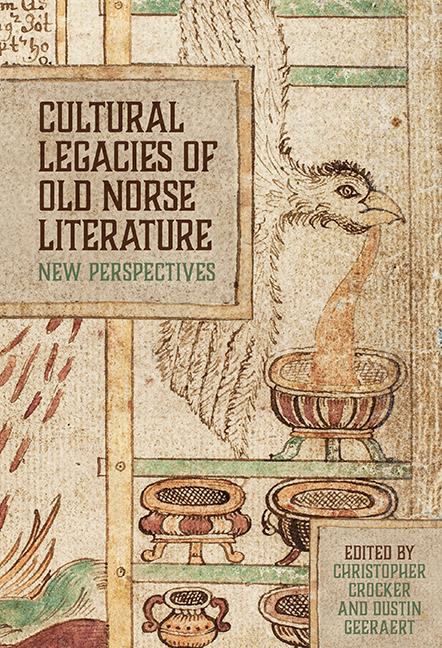Book contents
- Frontmatter
- Contents
- List of Illustrations
- List of Contributors
- Foreword: Old Norse and the Porous Boundaries of Medievalism
- Acknowledgements
- Note on the Text
- Introduction
- 1 Dr Jekyll and Mr Hyde in Medieval Iceland: Saga Realism and the Sworn Brothers
- 2 The Malleability of the Past: Íslendingabók as Narrative History
- 3 Women’s Work and Material Culture in Medieval Iceland: Gender, Narrative, and Cloth Production
- 4 Vafþrúðnismál, from Parchment to Print: Stability and Change in the Transmission of Eddic Poetry
- 5 The Odinic Motif: The Wanderer in the Mist
- 6 What has Darwin to do with Óðinn? Shapeshifting, God, and Nature in the ‘Great Story of the North’
- 7 Madness, Mythology, and Mitteleuropa: Günter Grass’s Transformation of Old Norse Myth in The Tin Drum
- 8 Once More, with Fiction: Transforming Myth in Gerður Kristný’s Blóðhófnir and the Eddic Poem Skírnismál
- Afterword: Ethnographic Medievalisms
- Bibliography
- Index
8 - Once More, with Fiction: Transforming Myth in Gerður Kristný’s Blóðhófnir and the Eddic Poem Skírnismál
Published online by Cambridge University Press: 08 October 2022
- Frontmatter
- Contents
- List of Illustrations
- List of Contributors
- Foreword: Old Norse and the Porous Boundaries of Medievalism
- Acknowledgements
- Note on the Text
- Introduction
- 1 Dr Jekyll and Mr Hyde in Medieval Iceland: Saga Realism and the Sworn Brothers
- 2 The Malleability of the Past: Íslendingabók as Narrative History
- 3 Women’s Work and Material Culture in Medieval Iceland: Gender, Narrative, and Cloth Production
- 4 Vafþrúðnismál, from Parchment to Print: Stability and Change in the Transmission of Eddic Poetry
- 5 The Odinic Motif: The Wanderer in the Mist
- 6 What has Darwin to do with Óðinn? Shapeshifting, God, and Nature in the ‘Great Story of the North’
- 7 Madness, Mythology, and Mitteleuropa: Günter Grass’s Transformation of Old Norse Myth in The Tin Drum
- 8 Once More, with Fiction: Transforming Myth in Gerður Kristný’s Blóðhófnir and the Eddic Poem Skírnismál
- Afterword: Ethnographic Medievalisms
- Bibliography
- Index
Summary
Iceland's medieval literary heritage has always been closely tied to, and may even be the primary constitutive element of, Icelandic cultural identity. As such, there is no surprise that it has exercised such a considerable influence over modern Icelandic literature. The Nobel Prize winning Icelandic novelist Halldór Laxness (1902–98), for example, once wrote that ‘íslenskur rithöfundur getur ekki lifað án þess að vera síhugsandi um hinar gömlu bækur’ (an Icelandic author cannot live without being constantly mindful of the old books). Medieval Icelandic literature certainly exerted a profound influence over Laxness’ work as an author, editor, and cultural critic. Such influence is also evident in the works of many of the most well-known and highly esteemed modern Icelandic writers, including Guðbergur Bergsson (b. 1932), Svava Jakobsdóttir (1930–2004), and Sjón (b. 1962), to offer just a few examples.
This same influence extends to the work of the poet Gerður Kristný (b. 1970) whose Blóðhófnir (Bloodhoof) was awarded the Icelandic Literary Award (Íslensku bókmenntaverðlaunin) in 2010 and was nominated for the Nordic Council Literature Prize in 2011. The book is a modern verse retelling of a mythological narrative concerning the Old Norse god Freyr, his servant Skírnir, and the giantess Gerðr Gymisdóttir. As an adaptive work, Blóðhófnir reflects elements of several surviving medieval Icelandic texts, though it primarily draws on the eddic poem Skírnismál. Naturally, like all such works, it also involves departure from its source materials. The poem retains many of the same details and events described in Skírnismál and in other sources related to the poem. However, by employing certain narrative strategies, Gerður Kristný transforms the familiar mythic narrative in remarkable ways. The most prominent of these strategies, at least from the poem's outset, is the choice to retell the story solely from the perspective of Gerðr, the giantess and the poet's own namesake, and in her words alone. From this perspective, it is impossible to avoid identifying what lies at the heart of the familiar mythic narrative, which is a disturbing account of a woman who is threatened and compelled into entering into an abusive sexual union against her will.
- Type
- Chapter
- Information
- Cultural Legacies of Old Norse LiteratureNew Perspectives, pp. 161 - 180Publisher: Boydell & BrewerPrint publication year: 2022



